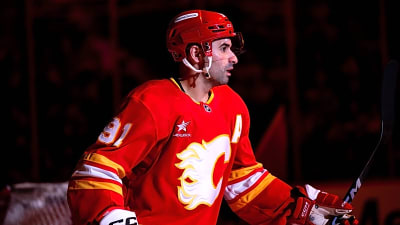
The Florida Panthers and Edmonton Oilers meet again in the Stanley Cup Final. It’s the first rematch in the championship series in over 15 years, and it’s bound to entertain.
After taking a 3–0 series lead in 2024, the Panthers did the unthinkable by letting the Oilers force a Game 7. In Florida’s barn, with everything on the line, the Panthers were victorious in a 2–1 nail-biter to bring Lord Stanley to Sunrise for the first time.
This series, beyond being a rematch, is pretty unique. It’s a display of two entirely different team-building philosophies, battling to see which one is superior. The Panthers and Oilers are polar opposites, but amazingly, equally dominant. Let’s discuss how they’ve built their teams, and whether they’ve improved since the last time they met on this stage.
Panthers’ Philosophy: Stars for Days
The Panthers’ philosophy is reminiscent of the 2002 Detroit Red Wings: accumulate as many stars as possible. The only difference is that this Florida team has a spending limit—they’ve defied expectations for how “stacked” a cap-era roster can be.
While they have top-to-bottom talent, the Panthers are primarily led by three superstars: Aleksander Barkov, Matthew Tkachuk, and Sam Reinhart. When they’re hot, this team is almost impossible to stop.
Barkov has basically unmatched two-way capabilities—that much is well-established. But it’s his offensive game that can really take over a series. He’s one of the most lethal playmaking threats in the NHL and wins a significant portion of puck battles. Reinhart, his partner in crime, is arguably the best two-way winger in the sport. He differs from Barkov in that he’s a major shooting threat. Though he’s only found twine four times in these playoffs, nobody has done so more than he has since the 2023–24 regular season began (110 goals, including the postseason).
Tkachuk does a lot of his own play-driving on the second line, if health permits it. He’s not fast or overly athletic, but he’s one of the most intelligent playmakers in the NHL. Coupled with a gritty, agitating style, the supreme cost of acquiring him in the 2022 offseason has been well worth it.
EVAN RODRIGUES HAS FIRST OF THE PLAYOFFS AND WE'RE TIED IN GAME 5!
— Sportsnet (@Sportsnet) May 29, 2025pic.twitter.com/ZDIfywpJCb
As stated, this trio is not alone. For most teams, the fact that none of these three are scoring above a point-per-game pace would be a death sentence. But Florida has an unfair collection of star talent to come up clutch when the superstars need it. Anton Lundell, Carter Verhaeghe, and Sam Bennett all have top-six skill sets. Aaron Ekblad and Gustav Forsling are top-pairing defensemen. Sergei Bobrovsky is a two-time Vezina Trophy winner between the pipes.
Already, that’s a ridiculous team. General manager Bill Zito went for the kill, though, by acquiring Brad Marchand and Seth Jones at the trade deadline. Those two were essential in lifting the Panthers past the Toronto Maple Leafs in the second round, and have been terrific all postseason.
When one of Florida’s stars goes cold for a few games, another rises to the occasion. It’s a never-ending cycle, and precisely what makes them so dangerous. Zito is a team-building wizard—being in a no-tax state may help, but only brilliant asset management allows for this. He rarely has a slip-up, and thus, the Panthers are three-time defending Eastern Conference champions.
Oilers’ Philosophy: Top-End and Secondary Scoring Meet
The Oilers have gotten depth scoring, too. But unlike the Panthers, this team lives and dies through two generational talents: Connor McDavid and Leon Draisaitl.
Not every superstar is created equal. Over the past three seasons, the best point-per-game rate a Panther has had in a single playoff run is 1.20, set by Tkachuk in 2023. That’s below the career averages of both McDavid (1.59) and Draisaitl (1.48), who are eyeing Mario Lemieux’s 1.61 point-per-game pace, second all-time to Wayne Gretzky, among qualified players.
Though the Oilers run through McDavid and Draisaitl, they have another superstar in their possession. Evan Bouchard is often dismissed as dependent on the two superstars, but it’s more of a mutual relationship. With 1.09 playoff points per game, Bouchard is second to Bobby Orr among qualified defensemen. The Oilers are getting Lemieux and Orr-type production from their superstars—it’s unfathomable.
Edmonton wouldn’t be in the Final without the rest of the team being up to par, though. In these playoffs, secondary scoring has come up clutch, and goaltending has held its end of the bargain. Though the Oilers’ depth isn’t nearly as talented as the Panthers’, the gap in superstar talent makes up for it. As a result, you have a stalemate. It’s anyone’s series to win.
How the Panthers Have Improved Since 2024
It took a down-to-the-wire Game 7 to knock off the Oilers last season. So, how did the Panthers get better, to ensure they can replicate the result?
Well, we already discussed it, albeit briefly. This is almost the same team as 2024, except with a couple of key differences. First, Brandon Montour was essentially subbed out for Jones. The latter has been an upgrade—he has seven points and a plus-9 rating across 17 contests. So, that branch is working out well. The second is more or less swapping Vladimir Tarasenko for Marchand, a distinct game-changer. Tarasenko’s nine points were key for the top-nine forward unit in 2024, and shouldn’t be dismissed, but Marchand’s 14 points and agitating play style have been even better. Florida doesn’t get out of Round 2 without the 37-year-old.
Other than those two, it’s a lot of the same for the Panthers. But that’s putting it a bit lightly. The defending Stanley Cup winners noticeably improved their roster. They’re grittier and more skilled—a combination that could again prove overbearing for the Oilers.
How the Oilers Have Improved Since 2024
It’s fair to think the Oilers have regressed from last season. Zach Hyman set the 21st-century record for single-season playoff goals in 2024, with 16. Losing him for the entire Stanley Cup Final is a tough blow, implying, on the surface, that this team is weaker than they were a calendar year ago. But that is objectively not the case.
Edmonton may have been a victory away from its first championship since 1990, but that was in spite of some serious flaws. Most notably, the defense behind Bouchard (and Mattias Ekholm) was virtually unplayable.

At 5-on-5, Bouchard had the playoff run of a lifetime. The Oilers had a plus-15 goal differential when he was on the ice—he was totally unstoppable. Well, at least by the opponent. When he was on the bench, the Oilers had a minus-14 goal differential. Their on-ice play was detrimental without Bouchard, and cost them the Stanley Cup.
But that’s all changed in 2025. He has a plus-8 rating at five-a-side action, which is still incredible. However, the Oilers are plus-8 when he’s off the ice, too. That’s a 22-goal turnaround—how’s that possible?
Enter the Oilers’ unsung heroes: Jake Walman and John Klingberg. Their puck-moving game and ability to stay out of their zone has changed everything. Cody Ceci was a top-four defender for this team in 2024, which proved to be a major flaw. So, they got rid of him and added two substantial on-ice assets.
The Hyman loss is a big blow, but the Oilers are still stronger than they were. While they aren’t perfect, as Darnell Nurse has a minus-1 rating at 5-on-5 (as opposed to the team’s plus-17 differential when he’s off the ice), Edmonton has taken a step in the right direction. It could change last June’s result.
Entirely different team-building philosophies are on display. One side drafted two generational talents, while the other built their roster brick-by-brick. Which philosophy will prove superior?
Stats courtesy of Natural Stat Trick
More must-reads:
- Cowboys WR CeeDee Lamb sends strong message after tempers flare at training camp
- Commanders' Jayden Daniels discusses Terry McLaurin's holdout amid contract dispute
- The 'Most NBA games played' quiz
Customize Your Newsletter
 +
+
Get the latest news and rumors, customized to your favorite sports and teams. Emailed daily. Always free!








